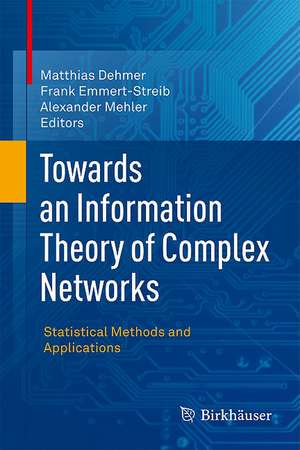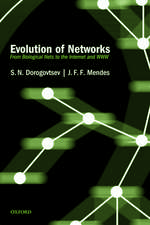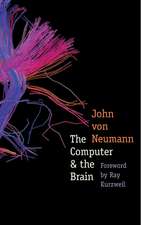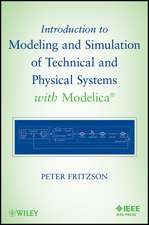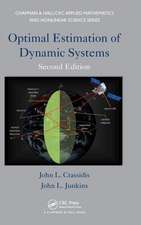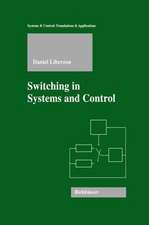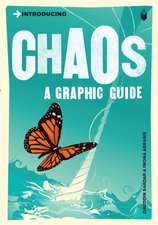Towards an Information Theory of Complex Networks: Statistical Methods and Applications
Editat de Matthias Dehmer, Frank Emmert-Streib, Alexander Mehleren Limba Engleză Hardback – 30 aug 2011
This volume is the first to present a self-contained, comprehensive overview of information-theoretic models of complex networks with an emphasis on applications. As such, it marks a first step toward establishing advanced statistical information theory as a unified theoretical basis of complex networks for all scientific disciplines and can serve as a valuable resource for a diverse audience of advanced students and professional scientists. While it is primarily intended as a reference for research, the book could also be a useful supplemental graduate text in courses related to information science, graph theory, machine learning, and computational biology, among others.
Preț: 657.67 lei
Preț vechi: 822.09 lei
-20% Nou
Puncte Express: 987
Preț estimativ în valută:
125.86€ • 136.67$ • 105.72£
125.86€ • 136.67$ • 105.72£
Carte tipărită la comandă
Livrare economică 22 aprilie-06 mai
Preluare comenzi: 021 569.72.76
Specificații
ISBN-13: 9780817649036
ISBN-10: 0817649034
Pagini: 395
Ilustrații: XVI, 395 p. 114 illus.
Dimensiuni: 155 x 235 x 24 mm
Greutate: 0.75 kg
Ediția:2011
Editura: Birkhäuser Boston
Colecția Birkhäuser
Locul publicării:Boston, MA, United States
ISBN-10: 0817649034
Pagini: 395
Ilustrații: XVI, 395 p. 114 illus.
Dimensiuni: 155 x 235 x 24 mm
Greutate: 0.75 kg
Ediția:2011
Editura: Birkhäuser Boston
Colecția Birkhäuser
Locul publicării:Boston, MA, United States
Public țintă
ResearchCuprins
Preface.- Entropy of Digraphs and Infinite Networks.- An Information-Theoretic Upper Bound on Planar Graphs Using Well-orderly Maps.- Probabilistic Inference Using Function Factorization and Divergence Minimization.- Wave Localization on Complex Networks.- Information-Theoretic Methods in Chemical Graph Theory.- On the Development and Application of Net-Sign Graph Theory.- The Central Role of Information Theory in Ecology.- Inferences About Coupling from Ecological Surveillance Monitoring.- Markov Entropy Centrality.- Social Ontologies as Generalizedd Nearly Acyclic Directed Graphs.- Typology by Means of Language Networks.- Information Theory-Based Measurement of Software.- Fair and Biased Random Walks on Undirected Graphs and Related Entropies.
Textul de pe ultima copertă
For over a decade, complex networks have steadily grown as an important tool across a broad array of academic disciplines, with applications ranging from physics to social media. A tightly organized collection of carefully-selected papers on the subject, Towards an Information Theory of Complex Networks: Statistical Methods and Applications presents theoretical and practical results about information-theoretic and statistical models of complex networks in the natural sciences and humanities. The book's major goal is to advocate and promote a combination of graph-theoretic, information-theoretic, and statistical methods as a way to better understand and characterize real-world networks.
This volume is the first to present a self-contained, comprehensive overview of information-theoretic models of complex networks with an emphasis on applications. It begins with four chapters developing the most significant formal-theoretical issues of network modeling, but the majority of the book is devoted to combining theoretical results with an empirical analysis of real networks. Specific topics include:
This volume is the first to present a self-contained, comprehensive overview of information-theoretic models of complex networks with an emphasis on applications. It begins with four chapters developing the most significant formal-theoretical issues of network modeling, but the majority of the book is devoted to combining theoretical results with an empirical analysis of real networks. Specific topics include:
- chemical graph theory
- ecosystem interaction dynamics
- social ontologies
- language networks
- software systems
Caracteristici
First book on the market giving a comprehensive look at the applications of information-theoretic models for complex networks Synthesizes graph-theoretic, statistical, and information-theoretic methods to effectively understand and characterize real-world networks Addresses a broad range of disciplines, including quantitative biology, quantitative chemistry, quantitative sociology, and quantitative linguistics Caters to both researchers and scholars across the sciences Includes supplementary material: sn.pub/extras
